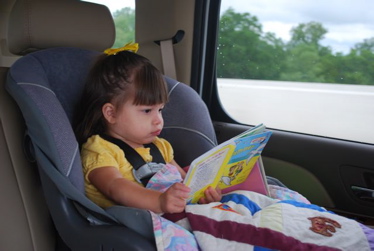Sharon M is a full-time mom with two children, ages 4 and 18 months. She and her family live in the Middle East, where her husband is a teacher.
 Packing Boxes. Shuffling through papers and toys, trying to decide what should stay and what should go. Finding new friends, new work, new EVERYTHING. Where do I shop? Where should my kids go to school?
Packing Boxes. Shuffling through papers and toys, trying to decide what should stay and what should go. Finding new friends, new work, new EVERYTHING. Where do I shop? Where should my kids go to school?
Most of us have experienced the stress of moving to a new place. Now, imagine that you’re not only going away from the place you call home, but you’re also diving headfirst into an entirely new country, usually complete with a new language and new culture for you to experience. Sound insane? Scary? Exciting? Welcome to the life of an ex-pat.
We’re all living abroad for different reasons. Some of us work for religious or non-profit organizations, a few of us have husbands who work for international companies, and many are working for the US government and are stationed overseas. I’d like to talk a little bit about my corner of the world, the Middle East. And what it’s like to raise what we call “third culture kids.”
These kids (TCKs for the rest of this article) have grown up a significant portion of their lives overseas outside their parents’ culture; they build relationships within all of the cultures they come in contact with, while never really having full ownership of any. Translation: Someone asks you, “Where are you from?” and you answer, “Uhhhh… (thoughtful silence)… America?” They tend to connect best with other kids that have had a similar childhood, and they are generally more mature than American kids their age. Mave, a mom of five (with #6 on the way), lived overseas for nine years with her family before returning to the States. She said:
Four of my children are settling into school in the US now. Three of the four have been naturally drawn to the “internationals” in their classes. My eldest son enjoys his friend from India. My second daughter enjoys a Korean- American and my youngest son plays with a boy from the Netherlands. I don’t know if this would be the case if we had not lived overseas.
Initially, language acquisition is the biggest concern for us as parents, because there is no way that these kids will ever feel connected to the locals if there isn’t some proficiency in the local language. One of my friends (a mom with three children ranging from 11 to 4) expressed frustration with a local private school – she had to “fight the schools to accept [her] children and school them as though they are nationals” when she first moved here. The kids have tutors every day, but she is so proud of them because they have learned the language. Her eldest sounds just like a local kid! Another friend of mine has a six year-old son who is rather shy and understands Arabic, but rarely speaks; he gets embarrassed when he doesn’t know what to say, and in a culture where boys are encouraged to be bold and aggressive, it can be a struggle for him.
As Americans living in the Middle East, our children stick out; the light-colored eyes, fair hair and fair skin practically scream “I AM NOT FROM AROUND HERE!” When the kids are young, it’s actually a wonderful way to meet people. I remember meeting one of my neighbors through my son. He saw her children playing on the patio, walked in the gate, said “Marhaba!” (hello) and joined them! And since people in general here are very hospitable and love children dearly, it wasn’t at all odd or rude. However, as the children get older, it is more and more obvious that they don’t look like everyone else, and it can be uncomfortable for the kids. Every mom I spoke with said that it is so important to have a strong family life, not too burdened with extra-curricular activities, and to connect with other moms who are living like you are (I call it “the sympathy circle”). This is important whether you live abroad or not, but as a mom who has lived in the US and overseas, I can tell you, it’s a necessity for my sanity!
We all love to see our kids eat “weird” things and like them. And when you’re outside your home country, it’s guaranteed that your kids are going to have to try the local food at one point or another. My fellow blogger Um Tulip said this about her son:
He likes foods that American boys wouldn’t touch. I remember taking him to a Middle Eastern restaurant with friends when we were back in America and he gobbled up the grape leaves. Our friends were astounded but it’s one of his favorite foods.
And remember, these TCKs are also growing up in the USA. They tend to be the children of immigrants or diplomats; they are Hispanic, Indian, Middle Eastern, African. While they might grow up to look and even to sound American, they have parents with a different set of cultural values, and who (often times) have built a little “home away from home” with other people from the same ethnic background. Many of them are grateful when, say, a co-worker invites them over for dinner or a mother they meet at the park arranges a play date. Being among strangers in a new country can be intimidating, and a simple gesture by you can make a world of difference in their lives.
For more information on this topic, I highly recommend Third Culture Kids: The Experience of Growing up Among Worlds by David Pollock.
Have you experienced the life of an ex-pat, either as a child or an adult? Have you been able to reach out to the ex-pats in your community, make them feel more at home where they live? If you’ve lived overseas, what sort of advice or encouragement would you give to other moms in a new cultural and linguistic environment?
 Last week Southwest Airlines escorted a mother and her 2 year old son off a flight to San Jose, CA, because he was screaming “Go Plane Go!” and “I want Daddy!” according the Associated Press. The crew was concerned that the passengers could not hear the safety briefing to abide within FAA guidelines. The mother, Pamela Root, assured the attendants that her son would be quiet after take off and that she had planned to feed him while in the air. Southwest Airlines has since apologized to the mother, refunded her money, and gave her a $300 dollar voucher for a future flight.
Last week Southwest Airlines escorted a mother and her 2 year old son off a flight to San Jose, CA, because he was screaming “Go Plane Go!” and “I want Daddy!” according the Associated Press. The crew was concerned that the passengers could not hear the safety briefing to abide within FAA guidelines. The mother, Pamela Root, assured the attendants that her son would be quiet after take off and that she had planned to feed him while in the air. Southwest Airlines has since apologized to the mother, refunded her money, and gave her a $300 dollar voucher for a future flight.
 I am late getting my post up today, because I spent 18 hours traveling by car with my husband, 2 year old daughter, and 4 month old boy. We came home to San Antonio after visiting
I am late getting my post up today, because I spent 18 hours traveling by car with my husband, 2 year old daughter, and 4 month old boy. We came home to San Antonio after visiting  My baby boy, Roman, is 4 months old and he had a harder time dealing with car than my 2 year old. He is still breastfed so I would have to get him out to feed him, but there wasn’t anywhere to lay him down and really let him stretch. Sometimes we would have to get him out of the car seat and just hold him for a while to calm him down. He did sleep a lot on the trip and didn’t cry a lot until the last leg home, when he was just done with being in a car seat. Even though he was with us, we both missed each other.
My baby boy, Roman, is 4 months old and he had a harder time dealing with car than my 2 year old. He is still breastfed so I would have to get him out to feed him, but there wasn’t anywhere to lay him down and really let him stretch. Sometimes we would have to get him out of the car seat and just hold him for a while to calm him down. He did sleep a lot on the trip and didn’t cry a lot until the last leg home, when he was just done with being in a car seat. Even though he was with us, we both missed each other. Packing Boxes. Shuffling through papers and toys, trying to decide what should stay and what should go. Finding new friends, new work, new EVERYTHING. Where do I shop? Where should my kids go to school?
Packing Boxes. Shuffling through papers and toys, trying to decide what should stay and what should go. Finding new friends, new work, new EVERYTHING. Where do I shop? Where should my kids go to school?
